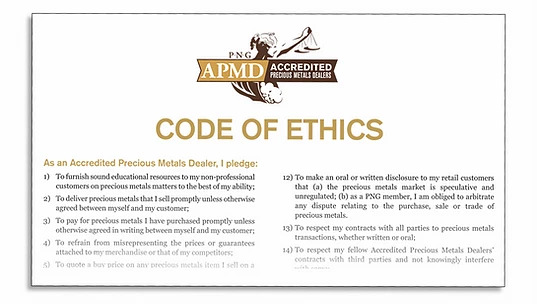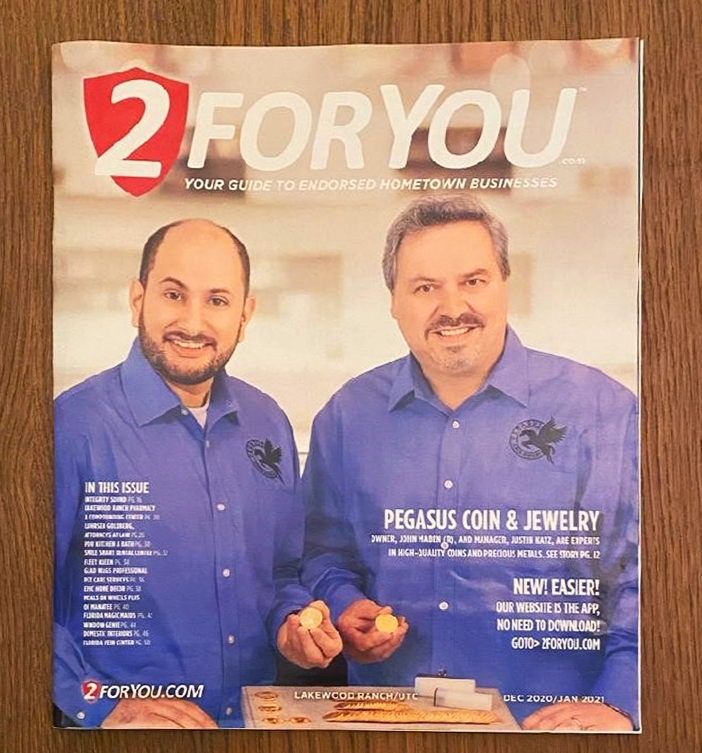Updated: Jul 11
So you are wary enough of the stock market — and the world’s exposure to rapid change — to wonder if diversifying into precious metals might make sense. Sure, many investment advisers say that gold, silver, platinum and other metals with intrinsic value can be hedges against inflation, falling stock prices and calamities.
But how do you find a precious metals dealer you can trust?
Anyone can set up shop as a precious metal dealer, from pawn shops, to coin and jewelry businesses, to online marketplaces.
One important sign a business is a reputable dealer is membership in the prestigious Accredited Precious Metals Dealers (APMD) program of the Professional Numismatists Guild. PNG membership has been a sign of high ethical standards and solid reputation among traders in coins, tokens and other similar collectible items for 65 years. PNG leaders, seeing a need for a similar organization for specialists in precious metals, formed APMD in 2015.

Why are these four letters important? Because to become and remain an APMD member, dealers must:
- Be a PNG member in good standing, which means they are held to the highest standards of ethics and professionalism and demonstrate its three essential qualifications: Knowledge, Integrity, and Responsibility. Other PNG standards are stated on its website.
- Pass a strict background check. All APMD member dealers also have had their industry reputation verified and their business practices vetted for expertise and fairness.
- Be proven experts in the field. APMD dealers are the most experienced and knowledgeable bullion, coin and paper money experts available anywhere.
- Be legally bound to settle disputes. All APMD dealer members must submit to legally binding arbitration to settle any dispute over the purchase, sale or trade of precious metals items.
- Follow the APMD Code of Ethics. This code goes beyond PNG’s rules to define strict business practices for buying and selling precious metals.
This Code specifies 26 consumer-oriented details, including prohibiting buying or selling at unreasonable prices; using high-pressure sales techniques; and using misleading performance data. Member dealers also are required to quote and post a buy price on any precious metals item they sell regularly.
The companies that spend heavily on fancy television commercials featuring retired celebrities are most likely not APMD members. Many of these companies follow a telemarketing business model, have commissioned salespeople, and offer an introductory “deal” — then call you repeatedly in hopes of selling much-higher-margin products.
No one selling precious metals bullion at Pegasus Coin and Jewelry receives a commission for sales and no one will ever call you later to attempt to sell you something else, unless you have requested that.
Violations of the APMD Code of Ethics may result in censure, suspension or expulsion from PNG and APMD.
Pegasus Coin and Jewelry owner John Maben has been a member of the Professional
Numismatists Guild since 1986 and served as a PNG board member from 2013 through 2017. He also is an Accredited Precious Metals Dealer, among other certifications and professional memberships.
“The fact is that, for decades, reputable coin businesses have been paying more, in many cases way more, than jewelry stores and pawn shops for precious metals,” said Maben, who has been a professional in the collectible coin business since 1978. “Not only that, they sell for less if you are looking to buy.
“APMD membership is a good indication of a dealer’s knowledge and ethical business practices.”





